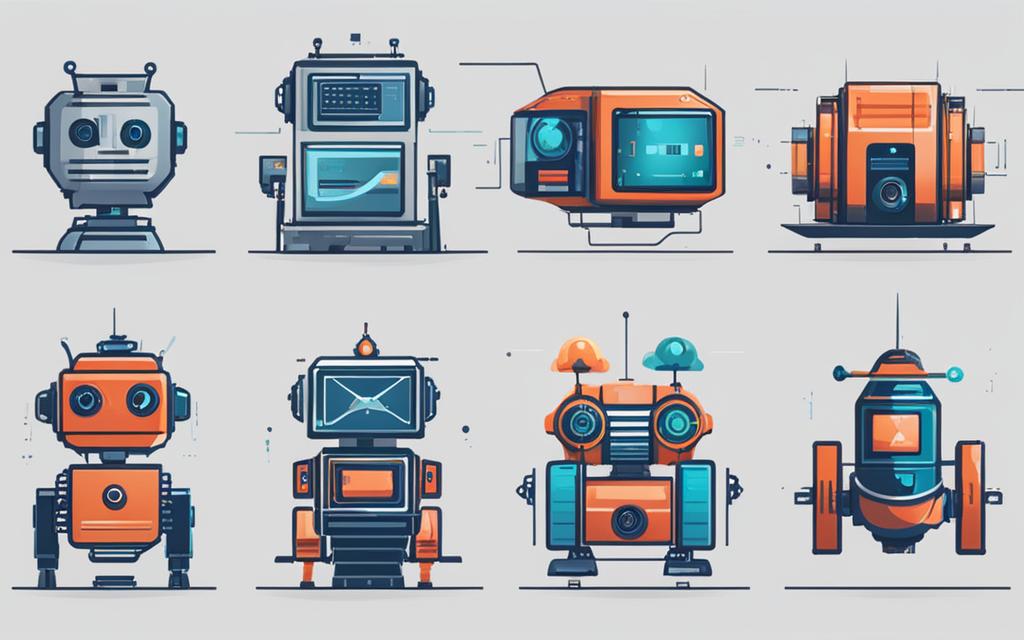Chatbots in Business: Their Rising Role & Impact
Chatbots are becoming increasingly popular in the business world as they revolutionize customer service, sales, and operations. These advanced computer programs use artificial intelligence (AI) to simulate human-like conversations and provide valuable benefits to businesses in various industries. In this article, we will explore the rising role of chatbots in business and their impact on customer experience, efficiency, and growth.
As technology advances, chatbots are playing an integral role in improving customer satisfaction and streamlining operations. They enable businesses to provide immediate and personalized assistance, 24/7, reducing wait times and increasing customer loyalty. The rising role of chatbots in business is evident in their ability to automate repetitive tasks, freeing up human agents to focus on more complex activities. This not only improves productivity but also leads to cost and time savings.
Furthermore, chatbots have a wide range of applications in various industries. They excel at information retrieval, quickly finding and delivering relevant information to users. Chatbots also play a vital role in lead generation and sales, collecting user information and qualifying potential leads. They can engage users in casual conversations, entertain them, and even assist with translations and data analysis.
Implementing chatbots in business offers several advantages. By leveraging the power of AI, businesses can enhance the customer experience, optimize efficiency, and make data-driven decisions. Chatbots provide round-the-clock service, scalability, and the ability to gather valuable insights. As customer expectations continue to evolve, integrating chatbots into business strategies is crucial for meeting those demands and staying competitive in today’s digital landscape.
In the following sections, we will dive deeper into what chatbots are, their history, the different types of chatbots available, their functionalities, and the benefits they bring to businesses. By the end of this article, you will have a comprehensive understanding of the rising role and impact of chatbots in the business world.
What Is a Chatbot?
A chatbot is a computer program that leverages the power of AI technology to interact with users through text or voice commands. With the ability to understand user input and provide helpful responses, chatbots have revolutionized the way businesses engage with their customers.
Chatbots are designed to perform a wide range of tasks, making them versatile tools in various industries. They can provide customer service support by answering questions and addressing concerns in a timely manner. Additionally, chatbots excel at information retrieval, quickly retrieving relevant data for users.
One of the key features of chatbots is their ability to engage in natural, human-like conversations. They can simulate casual interactions and provide users with a seamless and efficient experience. Whether it’s resolving customer issues or engaging in friendly banter, chatbots strive to mimic human interactions.
In order to function effectively, chatbots rely on AI technology to process and interpret user commands. They use algorithms and machine learning techniques to understand user intents and generate appropriate responses. This allows chatbots to continually improve and provide more accurate and relevant information over time.
Implementing chatbots in business has proven to be beneficial for both companies and customers. They enable businesses to provide round-the-clock support, enhance customer experience, and streamline operations. Customers benefit from instant assistance and personalized interactions, resulting in increased satisfaction and loyalty.
Chatbots have become an essential tool in the digital landscape, transforming the way businesses interact with their audience. With their sophisticated AI capabilities, chatbots offer an effective solution for efficient communication and customer service.
The History of Chatbots
Chatbots have come a long way since their inception. The history of chatbots showcases the evolution of AI and natural language processing technologies.
In the 1960s, the concept of chatbots began with simple rule-based systems like Eliza. These early chatbots simulated human conversation by following predefined rules.
In the 1970s, PARRY emerged as a chatbot designed to mimic a person with paranoid schizophrenia. It engaged in conversations by responding to user inputs based on a set of programmed rules.
The 1990s saw the emergence of AIML (Artificial Intelligence Markup Language), a language for creating chatbots. AIML became the foundation for many early chatbots, allowing developers to define patterns and responses.
In the 2000s, chatbots like SmarterChild gained popularity. SmarterChild was a chatbot available on instant messaging platforms like MSN Messenger and AOL Instant Messenger. It could provide weather updates, answer questions, and engage in casual conversations.
In 2011, IBM’s Watson made headlines by winning the television game show Jeopardy!. Watson showcased the potential of AI in natural language processing by successfully understanding complex questions and providing accurate answers.
Today, advanced chatbot models like ChatGPT are pushing the boundaries of chatbot technology. With the use of deep learning techniques, ChatGPT can generate human-like responses and engage in meaningful conversations.

The history of chatbots reveals a fascinating journey of advancements in AI and natural language processing. From simple rule-based systems to sophisticated AI models, chatbots have become an indispensable tool in various industries, revolutionizing the way businesses interact with customers.
Different Types of Chatbots
Chatbots have evolved into different types, each tailored to specific tasks and industries. Let’s explore the various types of chatbots:
Rule-based Chatbots
Rule-based chatbots operate on a predefined set of rules. They are ideal for handling basic customer queries or frequently asked questions (FAQs). These chatbots follow a structured decision-making process and provide prompt and accurate responses based on the pre-established rules.
Conversation AI Chatbots
Conversation AI chatbots leverage advanced technologies like machine learning and natural language processing (NLP) to provide natural and engaging conversations. These chatbots are trained on large datasets of customer interactions and can understand context, intent, and sentiment to deliver more personalized and human-like responses.
Voice Bots
Voice bots use voice recognition technology and can perform tasks through voice commands. With the increasing popularity of voice assistants like Siri, Alexa, and Google Assistant, voice bots are becoming more prevalent. They enable users to interact with chatbots using their voice, making it convenient for hands-free and on-the-go interactions.
Social Media Chatbots
Social media chatbots are integrated into popular messaging platforms like Facebook Messenger, WhatsApp, and Slack. They enable businesses to provide personalized conversations with customers, enhance engagement, and offer assistance directly within the social media platforms that customers frequently use.
These different types of chatbots cater to diverse business needs, allowing organizations to leverage chatbot technology effectively and deliver seamless customer experiences.
What Do Chatbots Do?
Chatbots have become highly versatile tools with numerous functionalities that offer significant benefits to businesses across industries. In this section, we will explore the various applications of chatbots in business and how they contribute to streamlining operations and enhancing customer experiences.
Customer Support and Assistance
One of the primary functions of chatbots is to provide efficient and round-the-clock customer support. By leveraging natural language processing (NLP) and artificial intelligence (AI), chatbots can effectively answer customer questions, address concerns, and provide solutions in real-time. With the ability to handle multiple inquiries simultaneously, chatbots significantly reduce response times and ensure prompt assistance for customers.
Information Retrieval
Chatbots excel at retrieving and delivering relevant information to users quickly. Whether it’s product details, company policies, or general knowledge, chatbots can efficiently search databases and provide accurate information, eliminating the need for customers to manually navigate through websites or contact support teams.
Automating Repetitive Tasks
Chatbots are highly efficient in automating repetitive tasks that consume valuable time and resources. From scheduling appointments to order processing and tracking, chatbots can streamline these processes, freeing up human resources to focus on more complex and strategic tasks.
Engaging Conversations and Entertainment
Chatbots are not just efficient problem solvers but also excellent conversationalists. They can engage users through casual conversations, creating personalized experiences that elevate customer engagement and satisfaction. Additionally, chatbots can entertain users by providing relevant recommendations, storytelling, or even engaging in small talk.
Lead Generation and Sales Assistance
Chatbots play a crucial role in lead generation and sales assistance. They can collect user information, qualify leads, and provide personalized recommendations based on customer preferences. By guiding users through the sales journey, chatbots assist in driving conversions and increasing revenue.
Translation, Data Analysis, Personalization, and Feedback Collection
Chatbots have the capability to assist with language translation, enabling businesses to communicate seamlessly with customers from different regions. They can also perform data analysis by collecting and organizing user data, providing valuable insights for improving marketing strategies and customer experiences. Additionally, chatbots facilitate personalization by tailoring interactions based on user preferences and past behavior. Moreover, chatbots can collect feedback from customers, enabling businesses to gather valuable insights and continuously improve their products and services.

Through their diverse functionalities, chatbots are valuable assets that enhance customer experiences, automate tasks, and contribute to business growth. In the next section, we will delve into the benefits of implementing chatbots in business and how they can drive success.
Benefits of Using Chatbots in Business
Implementing chatbots in your business can bring numerous advantages and benefits. By leveraging the power of conversational AI, chatbots enhance the overall customer experience by providing immediate and personalized assistance. They can understand user queries and provide relevant responses, reducing customer wait times and increasing satisfaction and loyalty.
One of the primary benefits of chatbots is the cost and time savings they bring to businesses. By automating customer interactions, chatbots reduce the need for extensive support teams, saving resources and improving operational efficiency. Moreover, chatbots provide round-the-clock service, ensuring that customers can access assistance anytime, anywhere.
Chatbots also offer scalability, allowing businesses to handle a large volume of customer inquiries simultaneously without compromising on service quality. This scalability is especially valuable during peak times or high-demand periods.
Another advantage of chatbots is their data collection and analysis capabilities. They can efficiently gather and process data from customer interactions, helping businesses make data-driven decisions and improve their marketing strategies. By analyzing customer behavior and preferences, businesses can deliver more personalized experiences and tailor their offerings to meet specific customer needs.
Furthermore, chatbots improve productivity by taking care of repetitive tasks, allowing human agents to focus on more complex and high-value activities. This not only optimizes resource allocation but also boosts the productivity and job satisfaction of employees.
With all these benefits in mind, it’s clear why implementing chatbots is a strategic move for businesses. They enhance customer experience, save costs, provide scalability, enable data-driven decision-making, and improve overall productivity.
Chatbots are a valuable tool in today’s digital landscape, and their advantages make them an essential asset for businesses across various industries.
Conclusion
Chatbots have become indispensable tools for businesses, revolutionizing customer interactions and optimizing operational efficiency. The increasing role of chatbots across various industries has proven their effectiveness in enhancing the customer experience, driving business growth, and staying competitive in the digital landscape.
As customer expectations continue to evolve, implementing chatbots is a wise investment for businesses. By harnessing the power of AI and chatbot technology, companies can improve customer service, reduce costs, increase engagement, and gain valuable insights for future success. The benefits of chatbots in business are undeniable, making them a valuable asset for organizations of all sizes.
Chatbots offer businesses the ability to provide immediate and personalized assistance to customers, reducing wait times and increasing customer satisfaction and loyalty. They can handle repetitive tasks and automate customer interactions, freeing up human agents for more complex activities. Moreover, chatbots provide round-the-clock service, scalability, and the capability to collect and analyze data, enabling data-driven decision-making and enhancing marketing strategies.
In summary, chatbots are a game-changer for businesses. They revolutionize customer service, optimize operations, and provide numerous benefits including enhanced customer experience, cost and time savings, and improved productivity. Embracing chatbot technology enables businesses to meet evolving customer expectations and drive success in today’s digital world.











